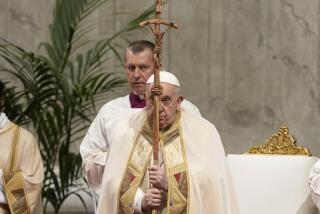A New Low in an Ugly Dispute
It is difficult, but not impossible, to imagine ways in which the controversy now surrounding the Carmelite convent at Auschwitz could become even more threatening and unseemly than it is now. One such way would be for people of good will to allow the anti-Semitic comments of Polandâs Roman Catholic primate, Cardinal Jozef Glemp, to pass unremarked upon and unrebuked.
It is unacceptable that an educated person in a position of authority should hold such views, let alone feel free to express them officially and publicly as Glemp did during a homily delivered last Saturday at Czestochowa.
His sermon marked a new low point in an ugly dispute that began five years ago, when a community of Carmelites--an order of contemplative Catholic nuns--moved into a building on the edge of the Nazisâ Auschwitz-Birkenau death camp. The structure originally had been used to store Zyklon-B, the poison used to murder millions of Jews and tens of thousands of Poles and others in the campâs gas chambers. The nuns said they intended to pray for the souls of the Nazisâ victims. Subsequently, however, a group of Belgian Catholics circulated a fund-raising letter for the convent, suggesting that the nunsâ purpose was to pray for Jewsâ conversion. As a result, Jews in Europe and elsewhere began to express objections to the conventâs presence in the camp.
In an attempt to resolve the matter, four Catholic prelates opened negotiations with leaders of various Jewish organizations. After two years of talks, they agreed that by February of this year the nuns would move to a new interfaith center to be built nearby.
When that deadline passed unmet, small groups of Jews began protests at the convent itself. Members of one of these groups--seven people from New York--were beaten by Polish workers after they scaled a fence and trespassed on the nunsâ enclosure. Not long afterward, one of the signatories to the agreement, Cardinal Franciszek Macharski of Cracow, announced that, because of the demonstrations, he would not move the convent.
Last Saturday, Glemp waded into this morass of suspicion and recrimination with a talk that reads like a syllabus of primitive anti-Semitic slanders. There was the ancient presumption of Jewish elitism: âDo not talk with us (Poles) from the position of a people raised above all others.â There was the hoary suspicion of Jews as cosmopolitan outsiders: âDo you . . . not see that your pronouncements against the nuns offend the feelings of all Poles, and our sovereignty?â There were the inevitable hints of conspiratorial influence: âYour (Jewish) power lies in the mass media that are easily at your disposal in many countries.â Perhaps worst and most dangerous of all, there was the preposterous calumny that the American protesters--whose intrusion into a cloister was, in fact, a coarsely provocative act--intended to kill the nuns.
Enlightened Poles already have repudiated the primateâs remarks. In a front-page editorial in Solidarityâs newspaper, Krzysztof Sliwinski, a leading Catholic writer, said Glemp had caused âreal and not artificial or paper pain.â He correctly observed that the cardinalâs âexpressions . . . threaten to deeply wound the feeling of many of those who are descendants and brothers of Holocaust victims.â
In the presence of the awful anguish and mystery that is the reality of Auschwitz, silence, humility and an exquisite deference to the sensitivities of other human beings are the things that become decent men and women. That terrible camp, where the marriage of hatred and force created crimes so unspeakable they defy sane explanation, is no place for unilateral acts, however well-intended. The construction of a convent there was a mistake. If the Church now fails to honor its agreement to move the Carmelites, their presence will become a tragedy in a place that should not--perhaps, cannot--bear another.
More to Read
Sign up for Essential California
The most important California stories and recommendations in your inbox every morning.
You may occasionally receive promotional content from the Los Angeles Times.










